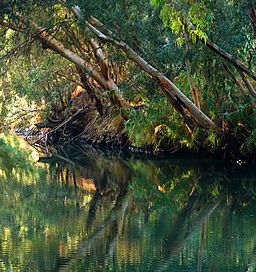Jordan River facts for kids
Quick facts for kids River Jordan (Arabic: نهر الأردن, nahr al-urdunHebrew: נהר הירדן, nehar hayarden) |
|
| River | |
| Name origin: Greek: Ιορδάνης, Hebrew: ירדן (yardén, descender) < ירד (yarad, to descend) | |
| Country | Israel, Jordan and Palestine |
|---|---|
| Tributaries | |
| - left | Banias River, Dan River |
| - right | Hasbani River, Iyon River |
| Landmarks | Sea of Galilee, Dead Sea |
| Mouth | Dead Sea |
| Length | 251 km (156 mi) |
The Jordan River is a famous river in Southwest Asia. It flows through a long valley called the Great Rift Valley and ends in the Dead Sea. Many people consider it one of the most important and sacred rivers in the world.
The river is about 251 kilometers (156 miles) long. It gets its water from several smaller rivers, called tributaries.
Contents
River's Journey
The Jordan River starts when four main rivers join together in northern Israel. These rivers are:
- The Hasbani, which comes from Lebanon.
- The Banias, which starts from a spring at the foot of Mount Hermon.
- The Dan, which also has its source at the foot of Mount Hermon.
- The Ayoun, another river flowing from Lebanon.
After these rivers combine, the Jordan River quickly drops in height. It flows about 75 kilometers (47 miles) to Lake Hula. This lake is a bit below sea level. Then, the river drops even more in about 25 kilometers (16 miles) to reach the Sea of Galilee.
The last part of the river flows more gently. It starts to twist and turn before it finally reaches the Dead Sea. The Dead Sea is very low, about 400 meters (1,300 feet) below sea level. It has no outlet, meaning water flows in but doesn't flow out. Two other important rivers, the Yarmouk River and Jabbok River, also flow into this last section of the Jordan River from the east.
Water Use and Challenges
The water from the Jordan River is very important for the dry lands in the area. It is a key resource for countries like Israel, Jordan, Syria, Lebanon, and Palestine.
Since 1964, people have built structures to use the river's water. Israel built a dam to take water from the Sea of Galilee. Jordan also built a channel to use water from the Yarmouk River. Syria has built reservoirs to collect water from the Yarmouk too.
Because so much water is taken for human use, the river's flow is much smaller now. About 70% to 90% of its water is used before it reaches the Dead Sea. This, along with high evaporation, is causing the Dead Sea to shrink. The southern part of the Dead Sea, which used to be shallow water, has now dried up and become salt flats.
Historical Importance
The Jordan River is mentioned many times in ancient texts.
In the Bible
In the Hebrew Bible, the Jordan River is described as making a large plain, called "Kikkar ha-Yarden," very fertile. This area was even called "the garden of God" in the Genesis (13:10).
The New Testament tells us that John the Baptist baptized Jesus in the Jordan River (Matt. 3:13). This event is very important for Christians.
Symbolic Meaning
The Jordan River often appears as a symbol in folk, gospel, and spiritual music. It is also found in poems and books.
For the Israelites, crossing the Jordan River was a big step. It marked the end of their difficult journey from slavery in Egypt to freedom in The Promised Land. Because of this, the Jordan can symbolize freedom and reaching a goal. It can also represent death itself, meaning the journey from life into Paradise or Heaven.
Images for kids
-
The Jordan River flowing into the Dead Sea.
-
Crossing the Jordan, from Die Bibel in Bildern.
-
Ruins at Al-Maghtas on the Jordanian side. This is believed to be where Jesus was baptized.
See also
 In Spanish: Río Jordán para niños
In Spanish: Río Jordán para niños









